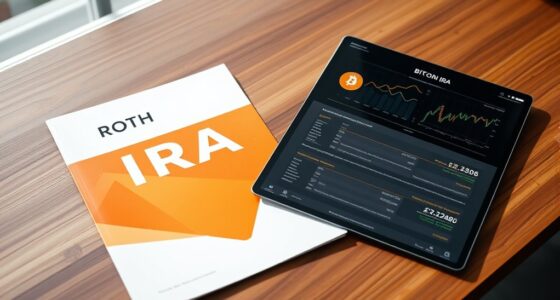Managing Bitcoin volatility means taking proactive steps to protect your IRA. Start by diversifying your assets, limiting Bitcoin exposure to 1-5% of your portfolio. This strategy helps balance risk while capitalizing on potential gains. Consider maintaining cash reserves for emergency funds, preventing the need to sell assets in turbulent times. Practice emotional discipline; stick to your investment strategy and rebalance your portfolio regularly. Additionally, be aware of the tax implications that come with Bitcoin trades. With these strategies, you can navigate wild price swings. Discover more ways to enhance your IRA safety amid volatility.
Key Takeaways
- Limit Bitcoin exposure to 1%-5% of your total portfolio to reduce overall risk during market fluctuations.
- Maintain three to six months' worth of expenses in cash reserves to avoid liquidating assets in emergencies.
- Regularly rebalance your portfolio to maintain a balanced risk profile and adapt to market changes.
- Implement dollar-cost averaging to mitigate emotional reactions to price swings and enhance long-term performance.
- Consult financial advisors for tailored asset allocation strategies that accommodate Bitcoin's volatility in your IRA.
Understanding Bitcoin Volatility

Understanding Bitcoin volatility requires you to grasp the intricate dance between supply and demand. The fixed maximum supply of 21 million coins creates a sense of scarcity, especially as the circulating supply nears its limit. This scarcity often leads to significant price swings when demand surges.
You'll notice that Bitcoin whales, or large holders, can dramatically influence market prices through their actions. A large sell-off or buy-in can trigger abrupt price movements, causing volatility to spike.
Investor psychology plays a crucial role here, too. Emotions like fear of missing out (FOMO) and panic selling can fuel rapid price fluctuations. When media coverage highlights significant announcements or predictions, it can amplify these reactions, driving prices up or down sharply.
You'll want to be cautious when investing in such a fluctuating market. Historical data shows extreme price swings in Bitcoin, sometimes exceeding $2,500 in a single day.
Consulting with a financial advisor can help you navigate these turbulent waters and make informed decisions about your cryptocurrency investments, keeping your financial goals in mind.
Diversification Strategies for Your IRA

When you're considering diversification strategies for your IRA, it's crucial to focus on effective asset allocation techniques.
By incorporating a mix of traditional assets and Bitcoin, you can mitigate risks while capitalizing on potential growth.
Understanding the risk management strategies associated with Bitcoin IRAs can also enhance your approach.
Regularly rebalancing your portfolio will help you maintain your desired risk level and adapt to market changes.
Asset Allocation Techniques
Diversifying your IRA is a smart way to manage risk, especially when dealing with assets as volatile as Bitcoin. Effective asset allocation can greatly reduce overall risk, allowing you to mitigate the impact of Bitcoin volatility on your IRA portfolio.
A common strategy is to limit your exposure to Bitcoin and cryptocurrencies to just 1% to 5% of your total portfolio, striking a balance between potential high returns and the inherent risks these digital assets carry.
Regular rebalancing is essential. As your investments fluctuate, you might need to sell portions of high-performing assets like Bitcoin to reinvest in more stable options, ensuring your IRA portfolio stays aligned with your risk tolerance.
Incorporating conservative investments, such as Treasury Inflation-Protected Securities (TIPS), can help preserve your purchasing power and provide a cushion against Bitcoin's wild swings.
Consulting with a financial advisor can further enhance your asset allocation strategy. They can tailor your diversification approach to fit your individual investment goals and risk appetite, ensuring a well-rounded strategy to navigate Bitcoin volatility effectively.
Risk Mitigation Approaches
To effectively manage the risks associated with Bitcoin volatility in your IRA, consider implementing a range of diversification strategies.
Start by diversifying your IRA with a mix of traditional assets like stocks and bonds alongside a small allocation to Bitcoin. This approach helps balance risk and reduces the impact of Bitcoin's price volatility, making your retirement accounts more resilient.
Additionally, incorporating assets like gold can provide a hedge against inflation and economic downturns, further enhancing portfolio stability during market fluctuations. This strategy aligns with the advantages of Gold IRAs, which offer long-term capital appreciation and act as a safe haven during volatility.
You might also want to adopt a dollar-cost averaging strategy when purchasing Bitcoin. By spreading your investment over time, you can mitigate the effects of market fluctuations, ensuring you don't invest all at once during a price spike.
Additionally, maintaining sufficient cash reserves within your IRA provides liquidity for emergency withdrawals, allowing you to avoid selling Bitcoin during market downturns.
Utilizing tax-advantaged accounts, such as Bitcoin IRAs, can limit tax liabilities on your gains. This strategy enables better long-term management of volatility without immediate tax implications.
By combining these risk mitigation approaches, you'll be better equipped to navigate the unpredictable landscape of Bitcoin while safeguarding your financial future.
Rebalancing Your Portfolio
Rebalancing your portfolio is essential for maintaining a balanced risk profile, especially in the face of Bitcoin's inherent volatility. By diversifying your retirement funds across a mix of assets—like stocks, bonds, and cash equivalents—you can stabilize your IRA during wild price swings.
As you approach retirement, consider gradually reducing your exposure to high-risk assets like Bitcoin, shifting towards more conservative investments to preserve capital.
Regular rebalancing guarantees you stick to your desired risk profile. It's advisable to reevaluate your asset allocation at least annually or after significant market movements. This practice helps mitigate risks associated with Bitcoin's fluctuations.
A well-diversified IRA might also include alternative investments, such as Treasury Inflation-Protected Securities (TIPS) or commodities, which can provide a buffer against market volatility.
Consulting with a financial advisor can help you develop tailored asset allocation strategies that align with your risk tolerance and retirement goals.
Importance of Cash Reserves

When managing Bitcoin volatility, having an emergency fund is essential. It acts as a buffer, allowing you to tap into liquid assets during tough times without liquidating your investments at a loss.
This financial cushion not only helps mitigate stress but also guarantees you can stick to your long-term strategy.
Additionally, having a clear understanding of your savings goals can further strengthen your financial position, enabling you to navigate market fluctuations more effectively.
Emergency Fund Necessity
Having a solid emergency fund is vital for retirees, especially in the unpredictable world of bitcoin investments. Maintaining a cash reserve of three to six months of expenses helps you avoid the need to sell your assets during market downturns. This financial buffer allows you to manage unforeseen expenses without impacting your retirement savings.
Experts recommend keeping up to five years' worth of expenses in cash equivalents to guarantee financial security. This approach provides you with a safety net against bitcoin volatility, so you don't have to liquidate your investments during unfavorable market conditions. Access to liquid savings is essential for covering emergencies, letting you sustain your lifestyle while sticking to your investment strategy, regardless of market fluctuations.
Establishing an emergency fund not only reduces financial stress but also gives you peace of mind. Knowing you have a cash cushion allows you to ride out the ups and downs of the bitcoin market without panic.
Liquid Asset Benefits
In times of market uncertainty, maintaining liquid assets can be a game-changer for retirees. For retirement savers, having a cash reserve of up to five years of expenses allows you to manage unexpected costs without the need to sell volatile investments like Bitcoin during downturns. This strategy guarantees that you maintain financial flexibility, providing a buffer against the risk of outliving your assets.
Access to cash equivalents, such as savings accounts or Treasury Inflation-Protected Securities (TIPS), can make all the difference when market conditions shift. A robust cash cushion helps you navigate periods of Bitcoin volatility with confidence, shielding you from the pressure to liquidate assets at unfavorable prices.
Experts recommend keeping three to six months of expenses in an emergency fund, which can prevent panic selling and protect your long-term investment goals.
Liquid assets serve as a crucial safety net, enabling you to cover unforeseen expenses while preserving your investment portfolio for future growth. By prioritizing a cash reserve, you're not just protecting your financial health; you're also setting yourself up for greater peace of mind in your retirement years.
Mitigating Financial Stress
Financial security is a cornerstone of a stress-free retirement, and maintaining a cash reserve is essential for achieving this stability. A well-structured cash reserve helps you manage unexpected costs without having to sell volatile investments like Bitcoin during market fluctuations.
Here are a few key benefits of having a cash reserve:
- Peace of Mind: Knowing you have liquid assets can reduce emotional stress, allowing you to ride out market downturns without panic.
- Avoiding Losses: Access to cash means you won't need to sell investments at a loss during turbulent times.
- Financial Flexibility: A cash cushion can help you cover expenses without dipping into your retirement accounts, which may incur tax penalties.
- Expert Recommendations: Financial advisors suggest keeping a cash reserve that covers three to five years of expenses to mitigate the risks associated with Bitcoin volatility and other market fluctuations.
Emotional Discipline in Investing

Maneuvering the unpredictable world of investing requires emotional discipline, especially when market conditions turn turbulent. It's easy to feel overwhelmed and make impulsive decisions during times of market volatility.
However, history shows that staying invested often leads to recovery and long-term gains, much like those who held through the 2008-2009 financial crisis.
To cultivate emotional discipline, regular rebalancing of your portfolio can be beneficial. It encourages you to buy low during market declines instead of succumbing to fear-driven selling.
By maintaining a disciplined savings and investment schedule, such as dollar-cost averaging, you can mitigate emotional reactions to market fluctuations. This approach allows you to focus on your long-term objectives rather than short-term noise.
Understanding risk as the probability of both positive and negative events fosters a balanced investment mindset, helping you stay calm and rational during high volatility.
Finally, remember that consistent contributions, even when markets are high, enhance your overall portfolio performance over time. Cutting back during these periods can hinder your long-term growth.
Keep your emotions in check, and stay committed to your investment strategy.
Tax Implications of Bitcoin Withdrawals

Understanding the tax implications of Bitcoin withdrawals is vital for maximizing your investment returns. When you decide to take money out of your Bitcoin IRA, it's important to know how different account types affect your tax situation.
Here are four key points to keep in mind:
- Traditional IRA: Withdrawals are taxed as ordinary income, which can greatly reduce your after-tax returns.
- Early Withdrawals: If you take money out before age 59½, you'll face a 10% penalty in addition to regular income taxes.
- Roth IRA: Withdrawals from a Roth IRA can be tax-free if the account has been open for at least five years and you're at least 59½ years old.
- Capital Gains: Selling Bitcoin within your retirement account might incur capital gains taxes, depending on your withdrawal strategy.
Strategic planning around these tax implications, such as evaluating Roth conversions, can help minimize your future tax liabilities on Bitcoin gains.
Regulatory Considerations for Bitcoin Investments

As you navigate the complexities of Bitcoin investments, it's important to contemplate the regulatory landscape that affects your choices. The U.S. Department of Labor has raised compliance warnings about including cryptocurrencies in 401(k) plans, highlighting the significant risks tied to their extreme price volatility and speculative nature.
If you're working with fiduciaries managing defined contribution plans, they must independently evaluate investment options to guarantee they meet minimum risk requirements—something Bitcoin often fails to do.
Additionally, cryptocurrencies are classified as capital assets by the IRS, which introduces specific tax implications, including capital gains taxes when you sell. The regulatory frameworks for Bitcoin are still evolving, with federal agencies actively studying risks and potential policy approaches. This ongoing scrutiny can directly impact your investment strategies.
Moreover, the lack of regulation and data integrity in the cryptocurrency market complicates the evaluation process for fiduciaries. This raises concerns regarding Bitcoin's suitability for retirement plans.
As a result, staying informed about these regulatory considerations is essential as you make decisions about incorporating Bitcoin into your investment portfolio.
Frequently Asked Questions
How Do I Protect My IRA From the Market Crash?
To protect your IRA from a market crash, maintain a cash reserve for expenses, diversify investments, implement a disciplined withdrawal strategy, and regularly rebalance your portfolio to manage risk and preserve your assets effectively.
How Do You Handle Bitcoin Volatility?
Steering through Bitcoin's choppy waters, you should dollar-cost average your investments, keep a cash reserve, and stick to a withdrawal strategy. Educate yourself continuously, and consider tax strategies to secure your long-term financial future.
How Do I Protect My 401K From Market Volatility?
To protect your 401(k) from market volatility, diversify your investments across stocks, bonds, and cash. Regularly rebalance your portfolio, maintain a cash reserve, and consider consulting a financial advisor to align with your goals.
How Do I Get Bitcoin Exposure in My Ira?
To get Bitcoin exposure in your IRA, choose a compliant Bitcoin IRA provider. Guarantee you retain control of your private keys, understand fees, and regularly review your investment strategy to maximize your returns.
Conclusion
So, there you have it! Managing Bitcoin volatility in your IRA is like trying to ride a roller coaster while blindfolded—exciting but risky! By diversifying, keeping cash reserves, and practicing emotional discipline, you can hopefully avoid that heart-stopping drop. Just remember, the IRS doesn't have a sense of humor about taxes, so stay sharp on those implications. And as for regulations? Well, let's just say it's like maneuvering through a labyrinth—without a map. Good luck!










